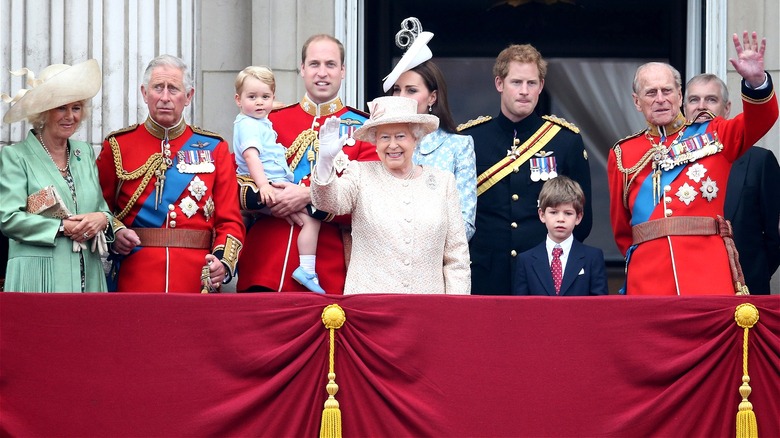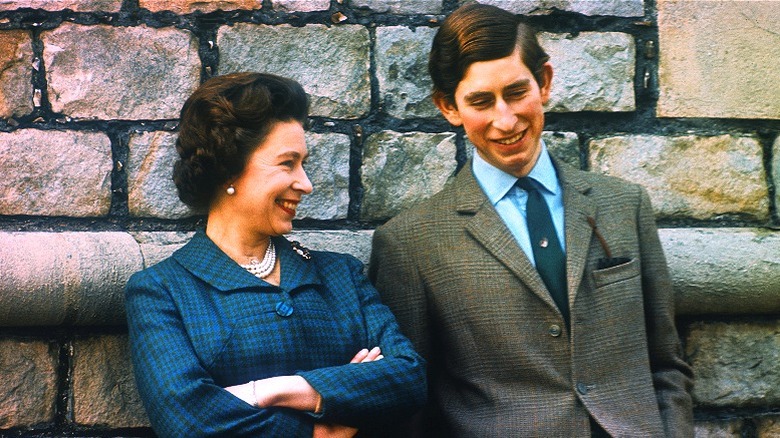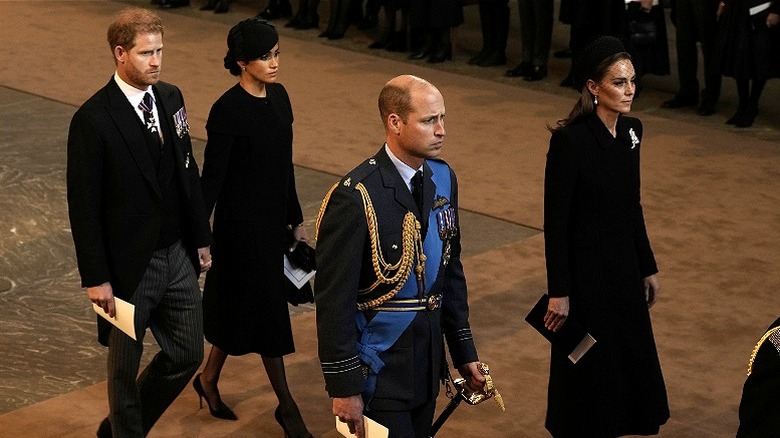How Queen Elizabeth II's Fortune Was Divided After Her Death
Though the passing of England's Queen Elizabeth II in September 2022 saddened the world, it must be said that the 96-year-old long-reigning monarch certainly lived a full life. She became queen in 1952 at the tender age of just 25, but also found time to start a family. The queen and her husband, Prince Phillip, had four children who later produced eight grandchildren. You might be familiar with a few of them and their celebrity spouses through tenacious media coverage, including Prince William and Prince Harry.
Aside from the queen's political and personal accomplishments, she also accumulated a personal fortune valued at approximately $500 million – that's half a billion dollars. Inquiring minds might wonder what exactly happed to the queen's estate upon passing, but unfortunately, the answer isn't completely transparent.
To say that Queen Elizabeth II's last will and testament isn't available to the public is an understatement (ever wondered what happens if you die without a will?). According to Reuters, as is customary with all royal wills, the document is sealed and stored in a safe for nine decades — that's 90 years. Still, that hasn't stopped news outlets like Forbes from doing some sleuthing that seems to indicate that Queen Elizabeth II's son, King Charles III, is the sole recipient of her personal estate.
Considerable real estate holdings accompany the crown
Besides reportedly inheriting Queen Elizabeth II's personal estate, King Charles III is also his mother's political successor, taking over as the United Kingdom's head of state. As the new monarch, Charles now manages institutions that comprise an estimated $42 billion in assets.
Some of these holdings include famous real estate like Buckingham Palace, the Tower of London, and Windsor Castle. Some less-famous parcels are nonetheless significant, like the Duchy of Lancaster, a collection of land worth more than $815 million. Better still, the Duchy of Lancaster generates income of $24 million per year, also payable to Charles. It's important to know that the reigning monarch doesn't technically own these properties. Instead, they're held in trust and not eligible to be sold.
Americans who have fretted over whether it's necessary to pay tax on an inheritance might be surprised to learn King Charles III wasn't required to pay inheritance tax on any of his windfall. That's owing to a 1993 agreement that exempts taxation on transfers of assets from one British sovereign to another. However, according to The Guardian, Charles chose to uphold the tradition of volunteering to pay income tax, which is something this mother did as well.
Some high-profile royals were excluded
Interestingly, followers of the royal family have previously noted that Prince Andrew was always considered to be Queen Elizabeth II's favorite son. As such, it only stands to reason that Andrew would receive at least of portion of the queen's personal fortune. However, the situation was complicated in recent years when Andrew's relationship with convicted sex trafficker Jeffrey Epstein was exposed, as well as other sexual abuse charges. Images surfaced with Prince Andrew, Epstein, and Epstein's associate Ghislaine Maxwell at the queen's Balmoral Estate in Scotland, cementing Andrew's new status as the family's black sheep and likely jeopardizing his inheritance.
It's believed that little, if any, of the queen's personal estate transferred down to her grandsons, King Charles III's sons Prince Harry and Prince William. Although Harry and William both attended the queen's eulogy in Aberdeen, Scotland, their wives — Meghan Markle and Kate Middleton, respectively — were conspicuously absent. What the public does know is that the prince and princess of Wales, William and Kate, are slated to move into the vacated Windsor Castle.
At more than 1,000 years old, Windsor Castle is the world's oldest active castle, however, it's reportedly too noisy for the preferences of King Charles III himself. With a new personal net worth estimated at $770 million, heaven knows that King Charles III can afford to live wherever he likes and is comfortable.


